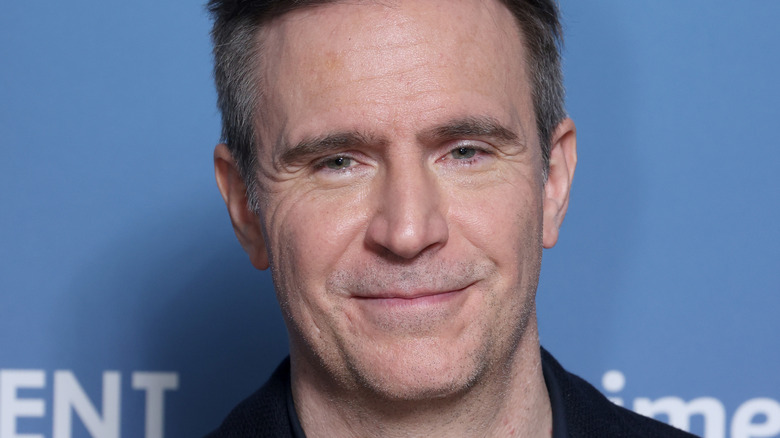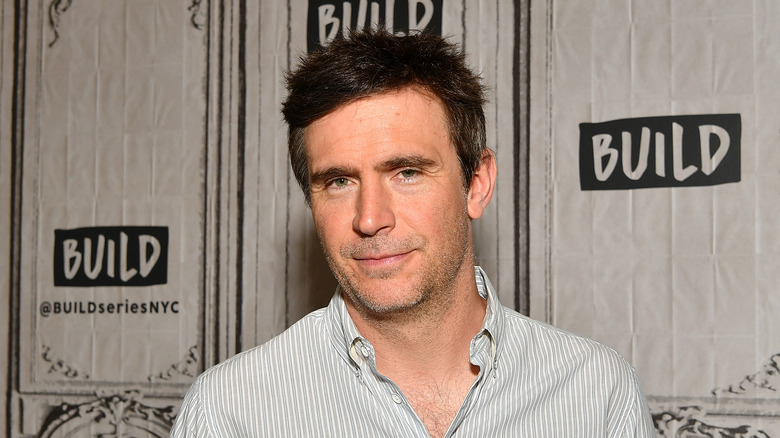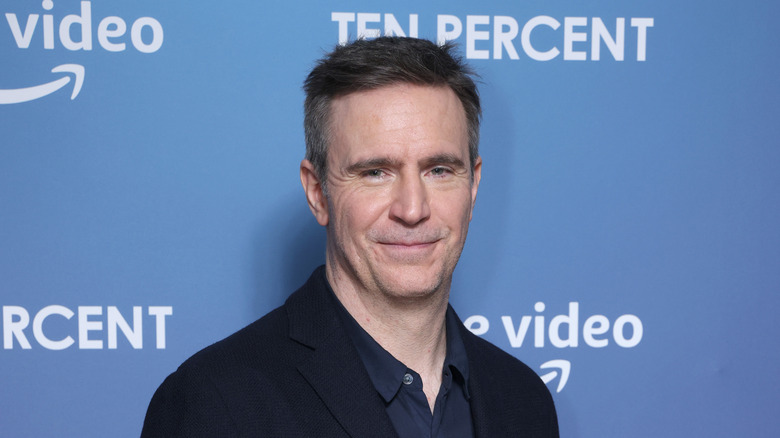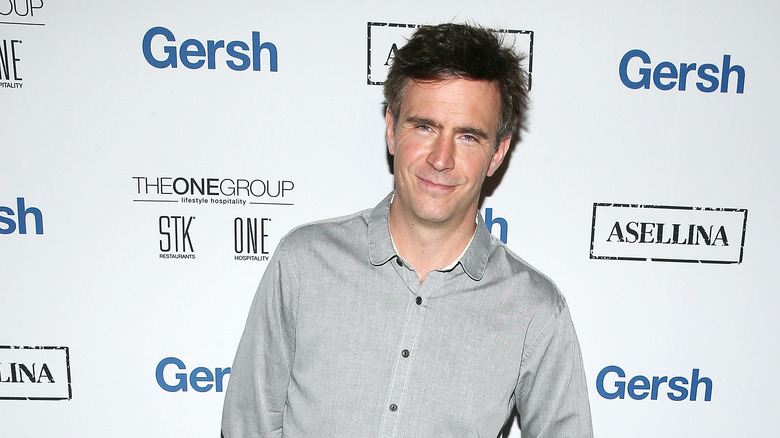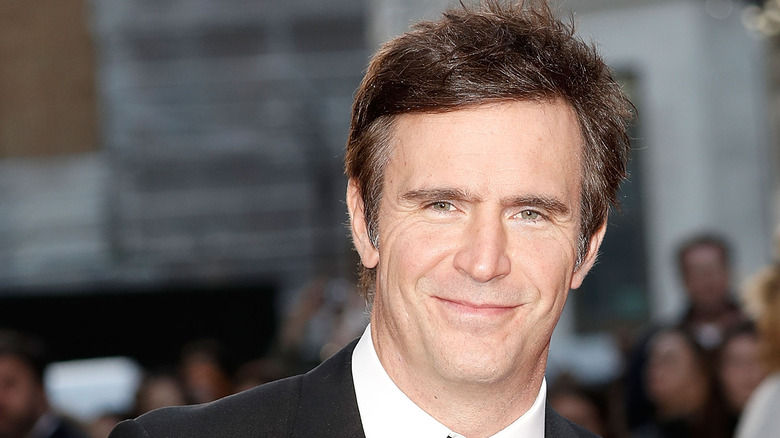Jack Davenport Reflects On Ten Percent, The Impact Of Humor, And More - Exclusive Interview
Perhaps one of the most important coping tools at our disposal these days is humor, and it's shows like "Ten Percent," starring the undeniably talented Jack Davenport, that remind us to find the funny lining in every situation. Fans will recognize Davenport not only from his role in the critically acclaimed series "The Morning Show," but also from his generation-defining performance as James Norrington in the "Pirates of the Caribbean" series.
In "Ten Percent," Davenport returns to the screen in the British remake of a slam-dunk French series about a talent agency flipped on its head with changing work dynamics, office shakeups, and the arrival of an enemy from across the pond. To say that "Ten Percent" is the series we all need to have a good laugh — while also thinking deeply about the changing world around us — is an understatement.
Ahead of the premiere of "Ten Percent" on April 29, we sat down with Davenport for an exclusive interview, where we chatted about the show, the dynamic world as we know it, and the challenges of striking the balance between humor, wit, and deeper meaning. In a singularly lovely chat with an actor that so many of us have grown up seeing on screen, Davenport also shed light on the very aspect that unites us all — compassion.
What initially drew Jack Davenport to Ten Percent?
Before we jump into the nitty-gritty of the show, I'd love to know what initially attracted you to the project. You're so well known for period dramas, and a comedic, modern set must have been an exciting experience for you.
Yeah. Well, the answer's quite simple — it's John Morton. I've admired his work for a long time. When I got sent the script, I think maybe with the first two episodes ... I've read a lot of scripts at this point in my life, and he's in a very, very thin band of screenwriters who's able to write dialogue that sounds entirely improvised, but which also has very precise comic beats to it. That's very difficult to do.
Also, he has this quality whereby he has this tenderness towards human frailty. He's very compassionate about it, but he's able to access comedy through that compassionate lens — which sounds like a bit of a bummer, but actually, it makes for a very rich tone to something because the tone of our show shifts a lot. It's done with such control because his writing is so precise and so beautifully engineered that I liken it to being given the keys to an amazing sports car. It's like, "Just don't drive off the corners and it'll take you." As soon as I read it ... I was aware of the original when I was sent the script and I had seen some of the original, but at that point, I was like, "Okay, I want this job very badly."
As you said, striking the balance between humor and compassion is not easily accessible.
It's really not. And in some ways, you have to have two abilities. You have the ability to be a sophisticated and confident comedy writer — which, again, there's a very small number of people who are that — but also this layer of an understanding of being human and making it ... You are not laughing at us, I don't think. A lot of the laughs in our show, even if you're not in the business, are ones of recognition because we all f*** up in these ways all the time. There's something quite comforting in that, because it's nicer to laugh at your mistakes than wallow in them. So that was definitely my main attraction. And as we went through the series, like the script, he had a team of writers, and they were all fantastic, but it was a joy to perform because it's all there.
Jack Davenport didn't anticipate his character's complex journey
The series seems to walk the line between situational humor and real-life circumstances that, as of the last couple of years, so many people have found themselves in — looking down the barrel at losing your job.
Truly.
In what ways could you relate to your character's development throughout the show?
First of all, I hadn't anticipated the journey that my character gets to go on. It's quite a ride. Consequently, it's the role of a lifetime for the reasons that you alluded to, because the situations that he ... Okay, we've all got dads. Some of our dads aren't alive anymore, so I know what that's like, and I know how destabilizing that is. I'm not an agent, but I've worked in this business for 30 years, so I'm very familiar with the centrality of the agent to the overall structure of show business as a whole. I've had an agent since I was 14 years old, so that was familiar.
There was a lot to hang your hat on, so I dived right in, because why wouldn't you? All of us have got wonderful parts, and everyone gets foregrounded. It's a true ensemble. Everyone gets to shine. We've all got a lane, and that's nice too because it means, for the audience, we all represent different qualities — or, in my case, lack of quality in some instances. Better that — he's flawed.
What was it like for the Ten Percent cast to have a British versus American dynamic?
When I was looking and doing my own research and preparation, there was such a personal way for me to connect to the show because we see this culture clash. It's British versus American, really, which was so unique for me because I am a British citizen, and I am a U.S. citizen.
Just like my son.
Yes, which was so fascinating for me because I was raised in a British household in the United States. That culture clash was so fascinating. It really throws your character's office for a loop. I'd love to know what that on-set dynamic was like.
One of the things that we get to play with in ways that the original can't — because they're French — is that there's only one American actor that can speak conversational French, and that's Sigourney Weaver, and they've used her. But the interchange between Hollywood and British show business is a well-trodden path. It's over a century old, and it's all to do with language. So that allows us to widen our scope in a way, which has a lot of mileage.
In terms of agency dynamics, people have asked me when I was doing it, "Do you think there'll be an American version of this?" And I was like, "Maybe. I don't know." But I feel like the definitive show about American agencies has been made, and it's called "Entourage," because American agencies are different. They're bigger. They're much more corporate.
The office dynamics are very different. We have a lot of fun with layering over that. It's a different business model, basically, that gets laid over our own little boutique agency in London. What's that old line about two cultures divided by a common language? There's a lot of that to play with, and having Chelsey [Crisp] come along ... How much of it have you seen?
I've seen quite a bit.
All right, so you've got to the Americans arriving?
Yes.
Again, it lights a spark under everyone as performers, because suddenly, there's a completely fresh energy. Also, there's just endless comic mileage to be had out of the slightly different ways of doing things. Hopefully, if we ever get to do it again, we can go deeper into that. It's one of the things that I found most exciting and fun. And also, I'm a British actor who's lived in America for 20 years. So I'm familiar with this stuff, and yeah, it's good stuff.
Jack Davenport reflects on Ten Percent's main takeaway
I've known you for period dramas, I've known you for workplace dramas, but this is fun — it's a breath of fresh air. What are you hoping viewers will take away from the show and from your witty role in it?
I only want the audience to enjoy it as a whole. As I said earlier, I've been doing this a long time, and I've had the privilege of working with some incredibly talented people and extraordinary writers, but John Morton is one of the most gifted writers I've ever had the privilege of working for and with. The way he melds the comic with the heartfelt in a way that it's never moreish or saccharine at all ... If anything, it's actually quite brutally clear-eyed in a lot of ways. There's that part of it.
Also, it's a proven fact that people like seeing the curtain pulled back on businesses that they think they know, but they don't, really. Show business is a public-facing business, but there's a whole lot of backstage. There's more backstage than front-stage. All of our writers — and as a group — we've done a pretty good job. I am, by nature, sort of ... You lived in a British Anglo-American household, so you know self-deprecation is a kind of reflex mechanism of all British people. But honestly, I've rarely been prouder to be in something. This is a really, really good show, and it hits emotional nerves that are very surprising. At the same time, there's a million good gags. Who wouldn't want those two things of an evening, right?
Absolutely.
And we've got all these guest stars being hilarious, being sort of themselves, and there's a lot of fun to be had out of that.
Yeah. I mean, Helena Bonham Carter playing herself is –
Helena Bonham Carter, for God's sake. Exactly. There's a lot to enjoy there. As I say, when one does this kind of stuff, sometimes one's slightly going through the motions because it's really hard to make something very good. But this is very good. I never say that, because it's slightly embarrassing to say it. So what would I say, other than — I genuinely believe we're worth your time. Give us a shot. I think you'll enjoy it.
The first two episodes of "Ten Percent" will exclusively premiere on AMC's Sundance Now and AMC+ on Friday, April 29, with new episodes released weekly. "Ten Percent" will debut weekly on the BBC starting May 1.
This interview has been edited for clarity.
